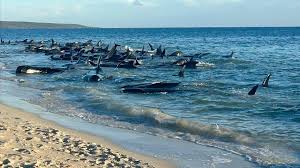A dramatic operation unfolded in Dunsborough, south of Perth, as wildlife officials raced to save over 100 pilot whales stranded on the beach. Ian Wiese, Chair of the Geographe Marine Research group, described the scene as overwhelming, noting the unprecedented size of the stranding.
Out of the 160 beached whales, 130 were successfully returned to the sea, but tragically, at least 28 whales perished, according to the Department of Parks and Wildlife Service Western Australia (DPAW). Despite the rescue efforts, there remains the risk of the whales beaching themselves again, prompting ongoing surveillance by spotter planes.
Reflecting on the chaotic scene, Wiese expressed relief at the positive outcome, acknowledging the challenges in saving such a large number of animals. Survival rates for beached whales are notoriously low, with deterioration setting in after approximately six hours on land.
Local residents and wildlife officials collaborated to keep the stranded whales upright and ensure their blowholes remained clear. Veterinarians were also on site, providing medical assistance to the distressed animals.
Pilot whales, known for their strong social bonds, exhibit a remarkable level of cooperation within their pods. However, the proximity to shore poses significant hazards, disrupting their natural care process and increasing the risk of stranding.
Wiese highlighted the presence of a newly-born calf among the stranded whales, speculating that its vulnerability may have contributed to the stranding event. This incident echoes previous mass strandings, such as the tragic event in Scotland where over 50 pilot whales lost their lives.
The challenges of marine conservation underscore the importance of ongoing efforts to protect vulnerable species and mitigate the impact of human activities on marine ecosystems.


















